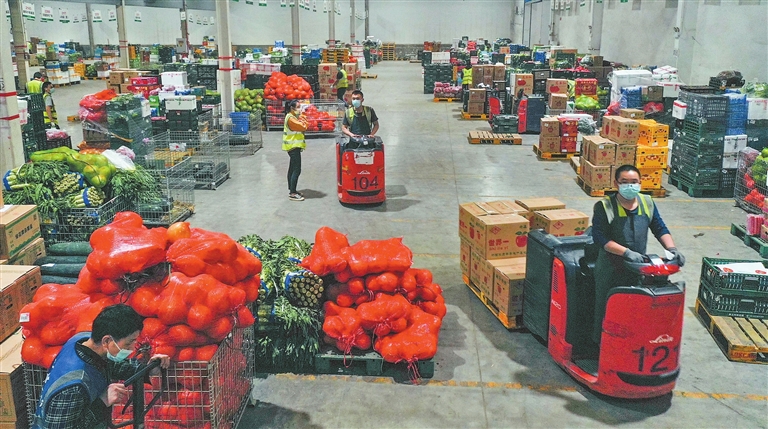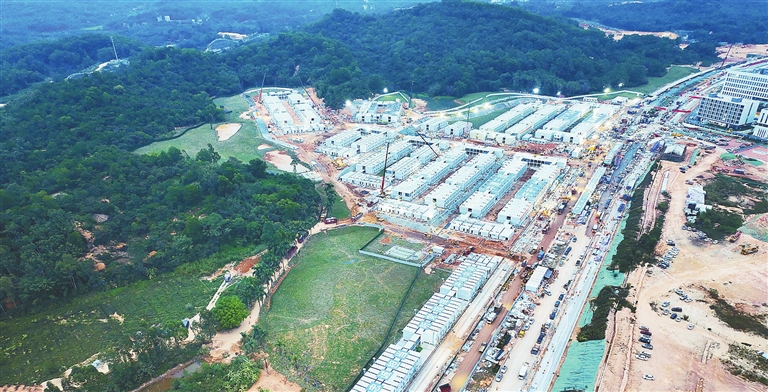

TO curb the latest COVID-19 resurgences across the country, Chinese authorities are implementing 20 newly-released measures in a more targeted and scientific manner to ensure people’s livelihoods. The Chinese mainland Monday reported 3,561 locally transmitted confirmed COVID-19 cases and 34,860 local asymptomatic cases, according to the National Health Commission. Medical treatment In a local hospital in Beijing, where 4,386 new local infections including asymptomatic carriers were reported Monday, separate wards and professional medical teams have been set up to provide medical treatment and intensive care for the high-risk groups. The Beijing Ditan Hospital also increased the number of medical staff in cardiology, endocrinology, and other disciplines for their diagnosis and treatment. To enhance the medical treatment capacity, South China’s Guangdong Province has quickly mobilized medical resources across the province. More than 8,000 medical staff from over 10 cities are supporting the provincial capital of Guangzhou, which registered 7,952 infections Monday. The capability of nucleic acid testing has further improved, with the daily testing capacity reaching 60 million. The construction of makeshift hospitals and quarantine places is speeding up. Zhang Yi, deputy director of the Guangzhou Municipal Health Commission, said 19 makeshift hospitals have opened in Guangzhou, and 28 hospitals have been designated to run those makeshift hospitals which will provide medical services to COVID patients. Southwest China’s Chongqing Municipality, which reported 8,792 infections Monday, is converting stadiums, markets, and other facilities to temporary medical centers to maximize the city’s admission capacity for patients. Grassroots efforts The grassroots organizations, such as neighborhood communities, have been on the frontline of epidemic prevention and control. In Chongqing, more than 600,000 people, including Party members and officials, residents and couriers, have offered volunteer services in the fight against the latest epidemic resurgence. Jinxing Community in Shapingba District has organized over 200 volunteers to set up WeChat groups for epidemic prevention and mutual assistance to help residents in 17 buildings. Volunteers play a significant role in maintaining the order of nucleic acid tests and purchasing and delivering the daily necessities for the community. Communities in the central urban area of Chongqing have set up a database in order to provide services for special groups including pregnant women, infants, and the disabled. In the Huagang Community of Guangzhou, the housing estate of resident Li Zhuo was classified as high-risk. He quickly helped set up a volunteer team to help community staff with the daily services. “Though it’s hard work, it’s well worth it as we are protecting the safety of residents in our community,” Li said. “We cannot do great things, but we can do small things with love.” Guaranteeing livelihoods The Ministry of Commerce has pledged more efforts to ensure the supply of daily necessities, especially for residents in areas hard hit by the COVID-19 resurgence. More efforts will be made to ensure efficient logistics in closed-off management areas, with priorities given to the elderly, children, pregnant women, patients, and persons with disabilities. Local governments are optimizing measures to safeguard residents’ livelihoods amid the fight against the latest COVID-19 resurgence. Beijing has pledged to expedite the reopening of shopping malls and supermarkets affected by COVID-19, and e-commerce platforms are stocking up supplies and recruiting more delivery staff to cater to the demands of those who cannot leave their homes. Dingdong, a fresh produce e-commerce platform, is also hiring third-party delivery contractors to serve their clients. In Chongqing, authorities organized retail companies to set up temporary stands outside the residential complexes that were under closed-off management. The local government has also asked e-commerce platforms and big supermarkets to increase stocks to meet surging online orders. The commerce ministry said it will continue to monitor the prices of daily necessities, timely release pork reserves, and improve cross-regional coordination to ensure ample supplies. (Xinhua) | 
